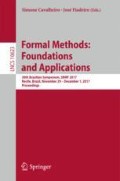Abstract
We describe a new method of synthesizing a formal model for real-time systems from scenarios. Scenarios, formally defined as Timed Event Sequences, together with mode graphs are used to describe behaviors of real-time systems. Given a set of Timed Event Sequences and a mode graph, our synthesis method constructs a minimal, acyclic, timed automaton that models the specified aspects of the system. We formalize criteria that a set of scenarios must satisfy in order to make it feasible to generate such an automaton.
The preliminary research was carried out while the first author was at the University of Minnesota, Duluth.
Access this chapter
Tax calculation will be finalised at checkout
Purchases are for personal use only
Notes
- 1.
We will use the abbreviation for both the singular and the plural form of the term.
- 2.
The acyclicity of our automaton does not prevent it from being used as a timed automaton with infinite runs, as will be explained in Sect. 6.
- 3.
We will follow the usual convention and use “clocks” instead of “clock variables”.
- 4.
This is just a convenient convention, not a real restriction.
- 5.
The nodes will be the locations of the synthesized automaton.
References
Alur, R., Dill, D.L.: A theory of timed automata. Theor. Comput. Sci. 126(2), 183–235 (1994)
Alur, R., Holzmann, G.J., Peled, D.: An analyzer for message sequence charts. In: Margaria, T., Steffen, B. (eds.) TACAS 1996. LNCS, vol. 1055, pp. 35–48. Springer, Heidelberg (1996). https://doi.org/10.1007/3-540-61042-1_37
Ben-Abdallah, H., Leue, S.: Timing constraints in message sequence chart specifications. In: Mizuno, T., Shiratori, N., Higashino, T., Togashi, A. (eds.) FORTE 1997. IFIP, vol. 107. Springer, Boston (1997). https://doi.org/10.1007/978-0-387-35271-8_6
Cimatti, A., Palopoli, L., Ramadian, Y.: Symbolic computation of schedulability regions using parametric timed automata. In: RTSS (2008)
Clarke, E.M., Klieber, W., Nováček, M., Zuliani, P.: Model checking and the state explosion problem. In: Meyer, B., Nordio, M. (eds.) LASER 2011. LNCS, vol. 7682, pp. 1–30. Springer, Heidelberg (2012). https://doi.org/10.1007/978-3-642-35746-6_1
Damas, C., Lambeau, B., Roucoux, F., van Lamsweerde, A.: Analyzing critical process models through behavior model synthesis. In: Proceedings of the 31st International Conference on Software Engineering, pp. 441–451. IEEE Computer Society (2009)
Giese, H.: Towards scenario-based synthesis for parametric timed automata. In: Proceedings of the 2nd International Workshop on Scenarios and State Machines: Models, Algorithms, and Tools (SCESM), Portland, USA (2003)
Heitmeyer, C.L., Pickett, M., Leonard, E.I., Archer, M.M., Ray, I., Aha, D.W., Trafton, J.G.: Building high assurance human-centric decision systems. Autom. Softw. Eng. 22(2), 159–197 (2015)
Lengauer, T., Tarjan, R.E.: A fast algorithm for finding dominators in a flowgraph. ACM Trans. Program. Lang. Syst. 1(1), 121–141 (1979)
Nicolescu, G., Mosterman, P.J.: Model-Based Design for Embedded Systems, 1st edn. CRC Press Inc., Boca Raton (2009)
Rational Software: Unified Modeling Language, version 1.1, September 1997
Saeedloei, N., Kluźniak, F.: Clock allocation in timed automata and graph colouring. http://www2.cs.siu.edu/~neda/report3.pdf
Saeedloei, N., Kluźniak, F.: Optimal clock allocation for a class of timed automata. http://www2.cs.siu.edu/~neda/report2.pdf
Somé, S., Dssouli, R., Vaucher, J.: From scenarios to timed automata: building specifications from users requirements. In: Proceedings of the Second Asia Pacific Software Engineering Conference, pp. 48–57. IEEE Computer Society (1995)
Uchitel, S., Brunet, G., Chechik, M.: Synthesis of partial behavior models from properties and scenarios. IEEE Trans. Softw. Eng. 35(3), 384–406 (2009)
Uchitel, S., Kramer, J., Magee, J.: Synthesis of behavioral models from scenarios. IEEE Trans. Softw. Eng. 29(2), 99–115 (2003)
Acknowledgements
The authors would like to thank one of the anonymous referees of an earlier version of the paper for detailed and helpful comments.
Author information
Authors and Affiliations
Corresponding author
Editor information
Editors and Affiliations
Rights and permissions
Copyright information
© 2017 Springer International Publishing AG
About this paper
Cite this paper
Saeedloei, N., Kluźniak, F. (2017). From Scenarios to Timed Automata. In: Cavalheiro, S., Fiadeiro, J. (eds) Formal Methods: Foundations and Applications. SBMF 2017. Lecture Notes in Computer Science(), vol 10623. Springer, Cham. https://doi.org/10.1007/978-3-319-70848-5_4
Download citation
DOI: https://doi.org/10.1007/978-3-319-70848-5_4
Published:
Publisher Name: Springer, Cham
Print ISBN: 978-3-319-70847-8
Online ISBN: 978-3-319-70848-5
eBook Packages: Computer ScienceComputer Science (R0)

